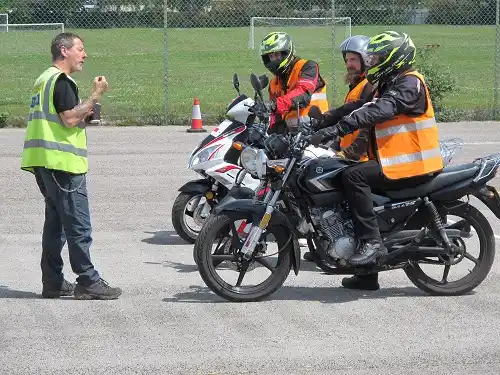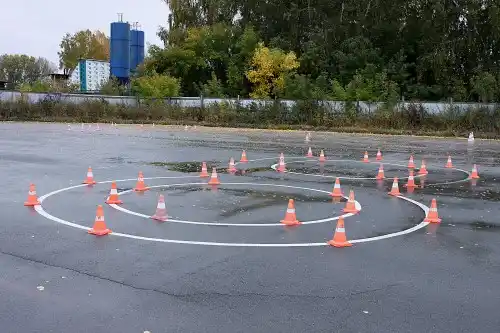Book a motorcycle test in Pontefract, West Yorkshire with any of the companies listed here
Click on any of the motorcycle training schools below to view more information and check availability.
S and K Motorcycle Training Pontefract
Frickley Athletic Football Stadium, Westfield Lane, South Elmsall, Pontefract, West Yorkshire, WF9 2EQ
Approx. distance: 7.1 miles
Professional Biker Training Hensall
Four Gables, Hensall, DN14 0QA
Approx. distance: 7.6 miles
S and K Motorcycle Training Barnsley
Old Drift Mine, Lund Hill Lane, Royston, Barnsley, South Yorkshire, S71 4BD
Approx. distance: 8 miles
Tommy Bee Motorcycle Training Leeds
Alverthorpe WMC, Flanshaw Lane, Wakefield, West Yorkshire, WF2 9JG
Approx. distance: 9.3 miles
A2B Motorcycle Training Ltd Church Fenton
East Leeds Airport, Church Fenton, North Yorkshire, LS24 9SE
Approx. distance: 10.8 miles
S and K Motorbike Training Wakefield
Dewsbury Rams Stadium, Owl Lane, Dewsbury, West Yorkshire, WF12 7RH
Approx. distance: 12.1 miles
The CBT and DAS Motorcycle Training School Ltd Doncaster
Marsh Gate, Doncaster, South Yorkshire, DN5 8AF
Approx. distance: 13.3 miles
BUMPY Ltd Birstall
Howden Clough Industrial Estate, Leeds Road, Birstall, West Yorkshire, WF17 0JB
Approx. distance: 13.9 miles
Moto Pass Doncaster
Dunsville Primary School, Broadway, Doncaster, South Yorkshire, DN7 4HX
Approx. distance: 14.7 miles
Wilsons Rother Ride Rotherham
Aldwarke Lane, Rotherham, South Yorkshire, S65 3SR
Approx. distance: 16.8 miles

Have you been hunting for a motorcycle test in Pontefract, West Yorkshire?
Have you been on the hunt for a company that can help you organise a motorcycle test in Pontefract or nearby in Featherstone, Castleford and Knottingley? Whilst price is important, the most important factor is the quality of motorcycle training. Book CBT Now has the largest listing of all motorcycle training companies in the UK. Simply enter your postcode and we will show you all of your local training companies that run motorcycle training and testing.
What are the different types of motorcycle licence I can get in Pontefract?
There are 4 main types of full motorcycle licence issued by the DVSA. The first three (AM, A1 and A2 motorcycle licences) have restrictions on the type of moped or motorcycle you can ride, the fourth (the full A motorcycle licence) has no restrictions.
The AM restricted moped licence
The A1 restricted motorcycle licence
The minimum age to take this test is 17. According to the DVSA website it will allow you to ride a "Light motorcycle up to 11 kW (and a power-to-weight ratio not more than 0.1 kW per kg) and 125 cc". This means it's up to a 125 cc motorcycle with some restrictions to make sure it cannot accelerate too fast - a really good idea when you are new to riding a motorbike!
Requirements to take the A1 motorcycle test - You must have a UK provisional or full driving licence, a valid theory test certificate and a valid CBT certificate. Once you have taken this test you will not have to keep renewing your CBT certificate every 2 years, you can ride on motorways and you can take a pillion passenger on the back of your motorbike.
The A2 restricted motorcycle licence
For this licence you need to be at least 19 years of age, have completed your CBT or have had an A1 licence for at least 2 years. As with the A1 test you also need to have a UK provisional or full driving licence and a valid theory test certificate . The main benefit of getting an A2 licence is you can ride a more powerful motorcycle. The law states a "standard motorcycle up to 35 kW (and a power-to-weight ratio not more than 0.2 kW per kg)". So it's a more powerful bike, but still not completely un-restricted. To find A2 legal motorbikes you are best visiting your local motorcycle dealer and asking them to show you the A2 legal bikes, as otherwise it's very difficult to work out just looking at the tech specs.
The full A motorcycle licence, or DAS licence.
This is the licence that allows you to ride almost any motorcycle without restrictions, so it's the ultimate motorcycle licence. No limits on power outputs or power per kg or engine size! It is also called a 'DAS' licence as it can be obtained from the 'Direct AccesS' route. There are two ways you can get this licence:
1) If you are 24 or over you can take the tests for an A licence. You must also have a UK provisional or full driving licence, a valid theory test certificate and a valid CBT certificate.
2) If you are at least 21 years of age and you have held an A2 category licence for at least 2 years. This is sometimes referred to as the 'progressive access' route as you progress from one licence to another.
When taking the test the biggest difference is that you have to use a bigger, more powerful motorcycle. It will have a power of at least 40kw and an engine cc of at least 595 cc. Your local training school will make sure you have the right size bike for your test.
There is also a flowchart (click here) that the DVLA have produced that shows these different licences and how to obtain them.
To get more detailed guidance on what licence is right for you then talk to your local motorcycle training school. You can search for them here and they are qualified to speak to you on the right type of training for you.
When can I take a pillion passenger on the back of my motorcycle?
In order to carry someone on the back of your motorbike you need to have a full motorcycle licence. This means one of the AM, A1, A2 or full A (also known as DAS) licences. This means that you cannot carry a pillion passenger if you only have a provisional licence, even if you have done a CBT. A CBT is not enough for you to take a pillion under any circumstances.
Even when you have passed your full motorcycle test you will need to make sure your motorcycle is properly equipped to take a pillion. As the rider you are legally responsible for your passenger, so it is very much in your interests to make sure your motorcycle is properly equipped. This means making sure there is a proper seat with foot rests and grab rail to hold on to. Your passenger must also wear a safety helmet (as well as all the other protective clothing!). Don't forget also that riding a motorcycle with a pillion is quite different than riding solo, so read up about the changes you need to make to your motorbike and riding style before attempting to take a pillion passenger.

What training is available after I have my licence?
You might think that once you have your licence that will be the end of motorcycle training. However, there are may good reasons why you might want to take additional training after you have passed your test, and there is plenty of additional training available.
The Enhanced Rider Scheme (ERS)
This scheme was devised by the DVSA and the motorcycle industry. The ERS course is run by many motorcycle training companies around the UK. It is for anyone who has a full motorcycle licence and wishes to check their safe riding skills. Not only will it make you a better rider but some insurance companies offer cheaper motorcycle insurance if you have been issued with a DVSA Certificate Of Competence. You will receive this certificate at the end of your ERS course if the instructor deems you to be a safe rider. If the instructor feels you need additional training it may be given on the day, or if it is felt you need a larger amount of training then you may need to come back on another day. Although ERS is not a test it is much like a CBT: provided you demonstrate a safe level of riding and knowledge during the day then you will be issued with your certificate. You can view a short video about ERS here.
BikeSafe
Spend a day with a police motorcyclist and without any danger of being arrested! Yes, the police force run training days for any rider who has a full motorcycle licence. The day involves some classroom theory as well as on road riding assessments. You will ride with a police motorcyclist and other riders on the same course as you. There is no test at the end of the day, it's designed to be enjoyable, interactive and above all to make you a better rider. For more information on BikeSafe courses and availability click here.
Advanced Training
Most motorcycle training companies offer advanced training, you can search for your local motorcycle training company here. Advanced training covers a wide range of subjects including progressive riding, advanced cornering, carrying a pillion passenger and motorway riding.
Rusty Riders
So you learnt to ride a motorcycle a while ago and have taken a break? Not sure how to get back on a bike? Not sure of all the new type of motorcycles available now and need some advice? They all go under the term 'rusty riders' meaning it's been a while since you last rode a bike and you need some help. Contact your local motorcycle training company to ask them about training for returning to biking.
Motorcycle maintenance
You may be able to ride a motorcycle perfectly but do you know how to look after one? What about that chain - how often should you lube it and when should you re-tension it? What about the suspension? Altering the stiffness of the suspension? Checking the oil level? Yes, these are all things you will need to know to look after your lovely new motorcycle or moped. There are some motorcycle training companies that run motorcycle maintenance courses. Just contact your local motorcycle training school and ask them about motorcycle maintenance.
What can I ride in Pontefract when I am 16?
When you are just 16 years of age your choices are more limited. There is a special category of licence called the 'AM' licence (derived from 'A' licence for 'M'opeds) that you can take when you are just 16 years old. You can of course, take it when you are older too, but it's the only full license available if you are under 17 years of age. You will still need to do all of the components of a full motorcycle test, namely your theory and hazard perception tests, your compulsory basic training (CBT), your module 1 off road test and your module 2 on road practical test.
This licence allows you to ride a moped of 50 cc or less which has a top speed of 28 mph, with a passenger and without Learner plates. If you are only interested in riding a moped and nothing more then this licence could be right for you. If you want to ride a more powerful motorcycle then you might find it better to wait until you are 17. From the age of 17 onwards you can take the A1 motorcycle test which allows you to ride motorcycle up to 125 cc and with some restrictions on its power to weight ratio.